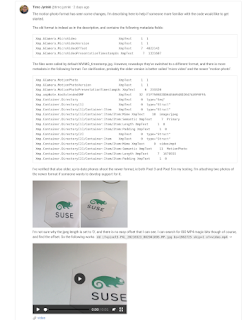Review:
The Light Brigade, by Kameron Hurley
| Publisher: |
Saga |
| Copyright: |
2019 |
| ISBN: |
1-4814-4798-X |
| Format: |
Kindle |
| Pages: |
355 |
In the wake of the Blink, which left a giant crater where S o Paulo was,
Dietz signed up for the military. To be a hero. To satisfy an oath of
vengeance. To kill aliens.
Corporations have consumed the governments that used to run Earth and have
divided the world between them. Dietz's family, before the Blink, were
ghouls in Tene-Silva territory, non-citizens who scavenged a precarious
life on the margins. Citizenship is a reward for loyalty and a mechanism
of control. The only people who don't fit into the corporate framework
are the Martians, former colonists who went dark for ten years and
re-emerged as a splinter group offering to use their superior technology
to repair environmental damage to the northern hemisphere caused by
corporate wars. When the Blink happens, apparently done with technology
far beyond what the corporations have, corporate war with the Martians is
the unsurprising result.
Long-time SF readers will immediately recognize
The Light Brigade
as a response to
Starship Troopers with
far more cynical world-building. For the first few chapters, the
parallelism is very strong, down to the destruction of a large South
American city (S o Paulo instead of Buenos Aires), a naive military
volunteer, and horrific basic training. But, rather than dropships, the
soldiers in Dietz's world are sent into battle via, essentially,
Star Trek transporters. These still very experimental transporters
send Dietz to a different mission than the one in the briefing.
Advance warning that I'm going to talk about what's happening with Dietz's
drops below. It's a spoiler, but you would find out not far into the book
and I don't think it ruins anything important. (On the contrary, it may
give you an incentive to stick through the slow and unappealing first few
chapters.)
I had so many suspension of disbelief problems with this book.
So
many.
This starts with the technology. The core piece of world-building is
Star Trek transporters, so fine, we're not talking about hard
physics. Every SF story gets one or two free bits of impossible
technology, and Hurley does a good job showing the transporters through a
jaundiced military eye. But, late in the book, this technology devolves
into one of my least-favorite bits of SF hand-waving that, for me,
destroyed that gritty edge.
Technology problems go beyond the transporters. One of the bits of horror
in basic training is, essentially, torture simulators, whose goal is
apparently to teach soldiers to dissociate (not that the book calls it
that). One problem is that I never understood why a military would want
to teach dissociation to so many people, but a deeper problem is that the
mechanics of this simulation made no sense. Dietz's training in this
simulator is a significant ongoing plot point, and it kept feeling like it
was cribbed from
The Matrix rather than something translatable into
how computers work.
Technology was the more minor suspension of disbelief problem, though.
The larger problem was the political and social world-building.
Hurley constructs a grim, totalitarian future, which is a fine
world-building choice although I think it robs some nuance from the story
she is telling about how militaries lie to soldiers. But the totalitarian
model she uses is one of near-total information control. People believe
what the corporations tell them to believe, or at least are indifferent to
it. Huge world events (with major plot significance) are distorted or
outright lies, and those lies are apparently believed by everyone. The
skepticism that exists is limited to grumbling about leadership competence
and cynicism about motives, not disagreement with the provided history.
This is critical to the story; it's a driver behind Dietz's character
growth and is required to set up the story's conclusion.
This is a model of totalitarianism that's familiar from Orwell's
Nineteen Eighty-Four. The problem: The Internet broke this model.
You now need North Korean levels of isolation to pull off total message
control, which is incompatible with the social structure or technology
level that Hurley shows.
You may be objecting that the modern world is full of people who believe
outrageous propaganda against all evidence. But the world-building
problem is not that some people believe the corporate propaganda. It's
that
everyone does. Modern totalitarians have stopped trying to
achieve uniformity (because it stopped working) and instead make the
disagreement part of the appeal. You no longer get half a country to
believe a lie by ensuring they never hear the truth. Instead, you equate
belief in the lie with loyalty to a social or political group, and belief
in the truth with affiliation with some enemy. This goes hand in hand
with "flooding the zone" with disinformation and fakes and wild stories
until people's belief in the accessibility of objective truth is worn down
and all facts become ideological statements. This does work, all too
well, but it relies on more information, not less. (See Zeynep Tufekci's
excellent
Twitter and Tear Gas if you're
unfamiliar with this analysis.) In that world, Dietz would have heard the
official history, the true history, and all sorts of wild alternative
histories, making correct belief a matter of political loyalty. There is
no sign of that.
Hurley does gesture towards some technology to try to explain this
surprising corporate effectiveness. All the soldiers have implants, and
military censors can supposedly listen in at any time. But, in the story,
this censorship is primarily aimed at grumbling and local disloyalty.
There is no sign that it's being used to keep knowledge of significant
facts from spreading, nor is there any sign of the same control among the
general population. It's stated in the story that the censors can't even
keep up with soldiers; one would have to get unlucky to be caught. And
yet the corporation maintains preternatural information control.
The place this bugged me the most is around knowledge of the current date.
For reasons that will be obvious in a moment, Dietz has reasons to badly
want to know what month and year it is and is unable to find this
information anywhere. This appears to be intentional; Tene-Silva has a
good (albeit not that urgent) reason to keep soldiers from knowing the
date. But I don't think Hurley realizes just how hard that is.
Take a look around the computer you're using to read this and think about
how many places the date shows up. Apart from the ubiquitous clock and
calendar app, there are dates on every file, dates on every news story,
dates on search results, dates in instant messages, dates on email
messages and voice mail... they're everywhere. And it's not just the
computer. The soldiers can easily smuggle prohibited outside goods into
the base; knowledge of the date would be much easier. And even if Dietz
doesn't want to ask anyone, there are opportunities to go off base during
missions. Somehow every newspaper and every news bulletin has its dates
suppressed? It's not credible, and it threw me straight out of the story.
These world-building problems are unfortunate, since at the heart of
The Light Brigade is a (spoiler alert) well-constructed time travel
story that I would have otherwise enjoyed. Dietz is being tossed around
in time with each jump. And, unlike some of these stories, Hurley does
not take the escape hatch of alternate worlds or possible futures. There
is a single coherent timeline that Dietz and the reader experience in one
order and the rest of the world experiences in a different order.
The construction of this timeline is incredibly well-done. Time can only
disconnect at jump and return points, and Hurley maintains tight control
over the number of unresolved connections. At every point in the story, I
could list all of the unresolved discontinuities and enjoy their
complexity and implications without feeling overwhelmed by them. Dietz
gains some foreknowledge, but in a way that's wildly erratic and hard to
piece together fast enough for a single soldier to do anything about the
plot. The world spins out of control with foreshadowing of grimmer and
grimmer events, and then Hurley pulls it back together in a thoroughly
satisfying interweaving of long-anticipated scenes and major surprises.
I'm not usually a fan of time travel stories, but this is one of the best
I've read. It also has a satisfying emotional conclusion (albeit marred
for me by some unbelievable mystical technobabble), which is impressive
given how awful and nasty Hurley makes this world. Dietz is a great
first-person narrator, believably naive and cynical by turns, and piecing
together the story structure alongside the protagonist built my emotional
attachment to Dietz's character arc. Hurley writes the emotional dynamics
of soldiers thoughtfully and well: shit-talking, fights, sudden moments of
connection, shared cynicism over degenerating conditions, and the
underlying growth of squad loyalty that takes over other motivations and
becomes the reason to keep on fighting.
Hurley also pulled off a neat homage to (and improvement on)
Starship Troopers that caught me entirely by surprise and that I've
hopefully not spoiled.
This is a solid science fiction novel if you can handle the
world-building. I couldn't, but I understand why it was nominated for the
Hugo and Clarke awards. Recommended if you're less picky about
technological and social believability than I am, although content warning
for a lot of bloody violence and death (including against children) and a
horrifically depressing world.
Rating: 6 out of 10
 Google Pixel phones support what they call Motion Photo which is essentially a photo with a short video clip attached to it. They are quite nice since they bring the moment alive, especially as the capturing of the video starts a small moment before the shutter button is pressed. For most viewing programs they simply show as static JPEG photos, but there is more to the files.
Google Pixel phones support what they call Motion Photo which is essentially a photo with a short video clip attached to it. They are quite nice since they bring the moment alive, especially as the capturing of the video starts a small moment before the shutter button is pressed. For most viewing programs they simply show as static JPEG photos, but there is more to the files. 
 It's been quite a long time since I last posted anything on this blog and I
can say that one of the reasons for that I don't feel comfortable using
It's been quite a long time since I last posted anything on this blog and I
can say that one of the reasons for that I don't feel comfortable using

 A new
A new  Sorry for not being on blog for sometime, the last few months have been brutal. While I am externally ok, because of the lockdown I sensed major hearing loss. First, I thought it may be a hallucination or something but as it persisted for days, I got myself checked and found out that I got 80% hearing loss in my right ear. How and why I don t know. Is this
Sorry for not being on blog for sometime, the last few months have been brutal. While I am externally ok, because of the lockdown I sensed major hearing loss. First, I thought it may be a hallucination or something but as it persisted for days, I got myself checked and found out that I got 80% hearing loss in my right ear. How and why I don t know. Is this  Example of Medical Bills people have to pay.
Example of Medical Bills people have to pay.  India-China Border Areas Copyright DW.com 2020
India-China Border Areas Copyright DW.com 2020 
 Last month, I got selected as a
Last month, I got selected as a 






 Like
Like 
 My website and blog are managed by the static site generator
My website and blog are managed by the static site generator